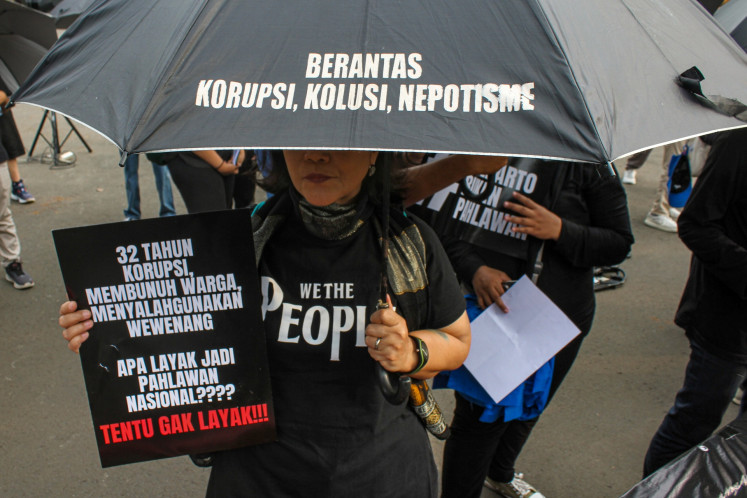Popular Reads
Top Results
Can't find what you're looking for?
View all search resultsPopular Reads
Top Results
Can't find what you're looking for?
View all search resultsAccelerate priority spending
The point is to accelerate budget disbursement and ensure targeted spending to prioritize health care, the social safety net and incentives for small businesses.
Change text size
Gift Premium Articles
to Anyone
P
resident Joko “Jokowi” Widodo’s announcement of a plan to issue a regulation in lieu of law (Perppu) to allow for a higher state budget deficit is the right choice. Indonesia will need more funds to cope with the overwhelming demand for healthcare services as COVID-19 cases rise, while businesses and workers will need safety nets to protect them from a precipitous downturn.
By increasing the state budget deficit ceiling from the current 3 percent of gross domestic product (GDP), Indonesia will be able to borrow billions of dollars more to battle the pandemic.
The point is to accelerate budget disbursement and ensure targeted spending to prioritize health care, the social safety net and incentives for small businesses.
The government has announced plans to reallocate Rp 62.3 trillion (US$3.9 billion) in state spending from the 2020 budget to provide health care, social funds and financial incentives for enterprises. This is on top of the Rp 158 trillion previously budgeted for the COVID-19 response.
As state tax revenue is expected to flatline or drop considerably because of reduced capacity in the economy and tax incentives given to individuals and corporate taxpayers, Indonesia will have to borrow.
Despite the country’s aversion to debt after the 1998 Asian financial crisis, now is the time to have an open mind. Borrowing is justified as long as the needs are high priority and the borrower has the ability to repay. Indonesia has been lauded for its fiscal discipline ever since the 1998 crisis, never having exceeded its state budget deficit ceiling of 3 percent of GDP nor its government debt ceiling of 60 percent of GDP.
Even though the House of Representatives’ budget committee has agreed to raise the deficit ceiling to 5 percent of GDP to respond to COVID-19, the ratio of government debt to GDP will still be capped at 60 percent. Indonesia’s debt-to-GDP ratio is about 30 percent, one of the lowest of its peers.
Now the Office of the Coordinating Economic Minister is preparing government debt papers whose proceeds will be used to rescue small businesses on the brink of collapse and prevent layoffs. But as foreign investors have fled Indonesia’s stock and bond markets, issuing government debt to finance the COVID-19 fight will be challenging.
Therefore, the government’s plan to issue a Perppu to allow the central bank to buy government bonds directly at auction, not in the secondary market as stipulated by the prevailing law, will also be crucial in financing Indonesia’s fight against the pandemic.
The clock is ticking. Overwhelmed hospitals are in dire need of medication and equipment to treat the sick, including protective gear for health workers. In addition, layoffs are starting and physicians have died. The nearly 25 million poor people in Indonesia and the 60 million people in danger of falling into poverty are at highest risk.
The mounting problems call for rapid relief efforts. The funds need to be collected and disbursed as soon as possible. Arduous bureaucratic barriers must be circumvented to throw lifelines to people and businesses in need.










